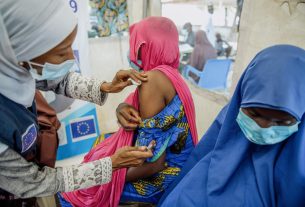Zimbabwe’s nurses are facing economic despair as plummeting wages, currency instability, and deteriorating working conditions continue to erode their livelihoods, with many unable to meet even the most basic needs.
“Nurses are living in abject poverty, unable to afford food, transportation, school fees, or rent,” said Enock Dongo, president of the Zimbabwe Nurses Association (ZINA), in a recent statement highlighting the dire reality confronting health workers.
Since 2018, the purchasing power of nurses’ salaries has collapsed due to the failure of Zimbabwe’s monetary reforms. The Zimbabwean dollar, once pegged at parity with the U.S. dollar, lost value rapidly before being replaced in 2023 by the gold-backed Zimbabwean Gold (ZiG). However, the ZiG too has lost more than 40% of its value in less than a year.
Nurses now earn less than USD 400 per month, down from USD 840 in 2018. Of this, only USD 240 is paid in hard currency, with the remainder in the devalued ZiG. Monthly deductions of up to USD 120 for government accommodation—taken directly from their dollar earnings—leave many nurses struggling to survive.
“This income is far below the poverty datum line,” Dongo warned, adding that many nurses walk long distances to hospitals, live in cramped housing, and cannot afford to educate their children.
ZINA is demanding a minimum monthly wage of USD 840 to restore dignity to healthcare workers and stem the exodus of professionals from Zimbabwe’s crumbling public health system. Hospitals, once considered among Africa’s best, have suffered under years of austerity, underfunding, and neglect.
“The public blames nurses for delays, but how can we perform miracles with no medicine, no equipment, and no support?” Dongo asked. Nurses are reportedly managing as many as 20 to 30 patients per nurse per shift, exposing them to extreme fatigue and increased infection risk.
The country’s health sector has also been hit hard by a mass emigration of nurses, many of whom are being recruited into the UK’s National Health Service (NHS) under a bilateral agreement. To curb this “brain drain,” the Zimbabwean government has allegedly withheld the academic certificates of over 4,000 qualified nurses, effectively preventing them from leaving the country.
“This is a blatant violation of their right to work where they choose,” said Dongo, calling for the immediate release of the withheld credentials.
In a rare public acknowledgment, Tino Machakaire, Zimbabwe’s Minister of Youth Empowerment, Development and Vocational Training, criticized the state of public hospitals following a personal visit. In a May 5 statement addressed to President Emmerson Mnangagwa, he wrote:
“The growing public outcry over our healthcare system is not an exaggeration… There is no substitute for seeing, listening, and understanding firsthand what our citizens are going through.”
Despite mounting calls from unions and the public, systemic reform remains elusive. As inflation soars and public trust in government erodes, healthcare workers are demanding not just fair wages but urgent attention to what has become a humanitarian and professional crisis.
📚 References:
- Peoples Dispatch, May 2025 – “Zimbabwe’s nurses are ‘living in abject poverty, unable to afford basic necessities’” by Pavan Kulkarni
- Zimbabwe Nurses Association (ZINA) official statements
- Public statement by Tino Machakaire, Minister of Youth Empowerment, May 5, 2025



